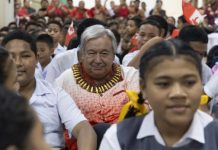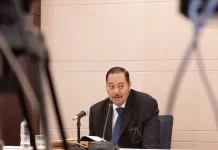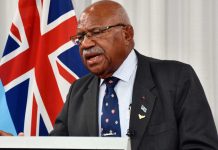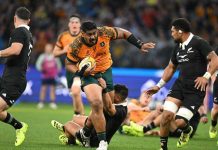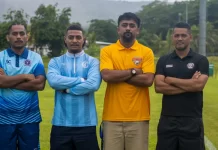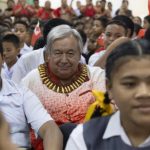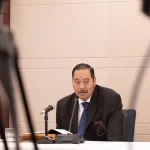For Charles Piutau, Tonga’s 102-0 defeat by New Zealand in July 2021 was a line in the sand. It was a thrashing that came with caveats – Covid-19 travel restrictions meant a weakened Tonga team – but as the All Blacks ran in 16 tries without reply in Auckland, it was clear things had to change.
Less than six months later, change finally came. World Rugby approved landmark amendments to its eligibility criteria, allowing players to switch Test nations in time for the World Cup. In what has become known as the heritage or birthright rule, players were now eligible to switch nations if they have been stood down for three years and if they, or a parent or grandparent, were born in the country they wish to represent.
The change had been a key part of the manifesto on which Bill Beaumont ran for re-election as World Rugby’s chairman, but required sustained lobbying from the former England captain to win enough support when it came down to a vote.
It was not unanimous and Joe Schmidt, who had just stood down as World Rugby’s director of rugby and high performance, also played a significant role in convincing wavering voters.
The upshot was that players such as Piutau, who won 17 caps for New Zealand between 2013 and 2017, could resurrect their international careers. Previously, the only route available was a convoluted sevens loophole but, suddenly, the door was flung open.
“It was massive, the gap between the tier one nations and tier two had got too big. This is just the start,” Piutau says. “I look at that Tonga game against the All Blacks and a start would be making those games a lot more competitive.”
Social media were suddenly awash with dream teams Tonga, Samoa and Fiji could pick and the change has been met with approval in the upper echelons of the game.
“It’s a very sensible rule,” says Eddie Jones, the Australia coach. “It gives players who have represented other countries and have natural allegiances to play for another country, it’s very good.”
Steve Hansen, who coached New Zealand to their 2015 World Cup triumph, agreed: “[These nations are] getting stronger and with the new rule they’ll be really strong.”
Along with Piutau, Tonga head to France with Adam Coleman, Vaea Fifita and Tau Koloamatangi bolstering their forward ranks. Augustine Pulu is also part of their squad, as is Toulouse’s classy centre Pita Ahki, having previously been unable to represent Tonga because he played sevens for New Zealand. So, too, George Moala, albeit suspended for their first three matches, and Malakai Fekitoa, who had already taken advantage of the sevens loophole. Israel Folau would probably have joined them if not for an untimely knee injury.
“This is obviously a different class of side compared to teams we have had in the past and it provides us with some massive X-factor,” Tonga’s head coach, Toutai Kefu, says.
Samoa have called on Lima Sopoaga, Ben Lam, Christian Leali’ifano, Charlie Faumuina, Steven Luatua and Fritz Lee. The effect is already obvious, judging by how closely Samoa ran Ireland last Saturday.
Samoa, lest we forget, are in the same World Cup pool as England, which brings us on to Fiji, who last Saturday put Steve Borthwick’s side to the sword. Fiji are a different case altogether, however, because they have not taken advantage of the birthright law in their World Cup squad. The former All Black Seta
Tamanivalu made the switch but has been rehabilitating from injury and did not make the final squad. Instead, the head coach, Simon Raiwalui, has put his faith in 18 players from the Fijian Drua side, who have been holding their own in Super Rugby since being admitted in 2022.
When World Rugby made the change, Raiwalui, Fiji’s high performance manager at the time, was sceptical. He questioned the detrimental impact on youngsters who have come through the pathway system only to lose their place to returning stars. It is a similar view offered by Billy Vunipola when he has been asked if he would, one day, like to represent Tonga.
There is a tendency to lump the three Pacific island nations together but there are far more people in New Zealand who identify as having Samoan or Tongan heritage than Fijian. So it stands to reason the change would benefit Samoa and Tonga disproportionately while Fiji have selected a significantly higher percentage of homegrown players.
It should also be said that not all tier two nations support the change or reap the benefits. Uruguay have described the move as a backwards step and have claimed that countries such as theirs are in effect being penalised for focusing their efforts on producing homegrown players. They question why Tonga and Samoa have been granted permission to pick All Blacks while Georgia, who continue to make strides based on domestic development, can not enter the Six Nations. In other words, those who have not properly invested in domestic development are being rewarded whereas those that have are not.
Moreover, rarely do law changes come without unintended consequences – in this case that tier one nations would take advantage. Samoa, Tonga, Romania and Namibia have all picked birthright players in their World Cup squads, but so, too, have Wales (Henry Thomas), Scotland (Jack Dempsey) and South Africa (Jean Kleyn).
You can hardly fault Warren Gatland, Gregor Townsend or Jacques Nienaber for taking advantage of the laws as they are now written, nor those players for accepting a route back into Test rugby. But it does not sit well that Wales, Scotland and South Africa are picking up cast-offs from England, Australia and Ireland, respectively. The law change was not intended to give them quick fixes in problem positions rather than encourage them to develop depth themselves.
The example of Kleyn sticks in the craw for two reasons. First, South Africa voted against the law change. Second, he is a classic example of a “project player”, someone recruited by Ireland when on the fringes of the Springboks setup with the explicit intention that they would qualify on residency grounds soon enough.
Kleyn won five caps for Ireland, in the buildup to and at the 2019 World Cup, and there is every chance he faces his former country in France given they and South Africa are in the same pool.
Increasingly, the law change comes to be seen as flawed. It bolsters Tonga and Samoa and therefore makes for a more competitive World Cup but it does little for wider or more long-term development and it is being exploited by bigger countries.
If the mouth waters at the prospect of Piutau leading the charge for Tonga then equally, there is a sour taste to that of Kleyn in action for the Springboks. Or that teams such as Uruguay feel so disadvantaged by World Rugby’s change.
Upsets by Samoa or Tonga could set the World Cup alight but the eligibility changes must not be seen as a short cut for sustained change.
SOURCE: THE GUARDIAN/PACNEWS


